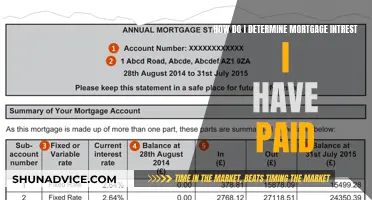
When it comes to comparing mortgage offers, it's important to do your research and shop around to ensure you get the best deal. There are a few key steps to follow: first, determine the type of mortgage you want and what suits your financial situation. Next, gather the necessary documents, such as proof of income, investments, and debt, to provide to lenders. Then, request loan estimates from multiple lenders and compare factors like interest rates, fees, monthly payments, and closing costs. It's also worth considering referrals from family and friends, as well as seeking help from a mortgage broker who can offer a wide range of options. Remember, taking the time to compare lenders can save you a significant amount of money in the long run.
How do I compare mortgage offers?
| Characteristics | Values |
|---|---|
| Interest rates | Compare interest rates offered by different lenders. |
| Discount points | Optional fees that borrowers can pay to lower the interest rate. |
| Closing costs | Some lenders advertise loans with "no closing costs," but these may have higher monthly payments. |
| Monthly payments | Regular payments on the same-sized loan can vary by $100 a month. |
| Loan term | Compare the loan term to see which offer better reflects your individual situation. |
| Loan amount | Compare the loan amount being offered by different lenders. |
| Lender credentials | Check if the lenders have the required state or federal credentials to originate mortgage loans in your state. |
| Customer reviews | Research lenders online to find those with positive customer reviews. |
| Negotiation | Use the quotes from lenders to negotiate better deals. |
What You'll Learn

Compare interest rates and fees
Interest rates and fees are key factors to consider when comparing mortgage offers. The interest rate is the cost of borrowing the principal loan amount, and it is usually expressed as a percentage. The annual percentage rate (APR) is a broader measure that reflects the total cost of the loan, including both the interest rate and other fees associated with the loan, such as lender fees, mortgage insurance, and closing costs. When comparing offers, pay attention to the APR, as it provides a more comprehensive view of the overall cost of the mortgage.
Mortgage rates can vary widely by lender, loan type, and term, and they can change frequently. It is important to shop around and compare rates from multiple lenders to ensure you get the best deal. You can do this by requesting Loan Estimates or pre-approvals from different lenders. A Loan Estimate is a standardized form that outlines important details about your loan offer, making it easy to compare interest rates and fees across different lenders. Try to keep pre-approval applications within the same 30-day period to prevent your credit score from dropping with each application.
When reviewing Loan Estimates or pre-approval offers, look for the interest rate and APR to understand the cost of borrowing. Additionally, consider other fees associated with the loan, such as closing costs, origination fees, appraisal fees, and title insurance. Discount points are another factor to consider. These are prepaid interest payments that can reduce the interest rate on your mortgage. One discount point typically costs 1% of the loan amount and can lower the interest rate by 0.25%.
Keep in mind that mortgage rates can be locked in for a set period, usually 30 to 45 days, to protect you from market rate increases during the home-buying process. Consult with your loan officer about the timing of the rate lock to ensure it aligns with your expected closing date. By comparing interest rates, APRs, and associated fees, you can make an informed decision about which mortgage offer best suits your financial needs.
Assessing Subprime Mortgage Investment: A Comprehensive Guide
You may want to see also

Research lenders online
Researching lenders online is a great way to find the right mortgage for you. There are a few steps you can take to make the process easier.
First, it's important to determine what type of mortgage you want to apply for and what is best for your current financial situation. You can then start to compare mortgage offers online. Many online lenders will advertise their current rates on their websites, but these may not apply to your specific situation. It's worth checking out third-party websites that compare and rate online mortgage lenders, such as Forbes Advisor, Bankrate, and Zillow. These sites will allow you to compare current mortgage rates and provide ratings and reviews of lenders.
When researching lenders, you should consider factors like interest rates, discount points, and closing costs. You can also look at customer reviews to see what other borrowers' experiences have been like. It's a good idea to ask family and friends for referrals, too.
Before choosing a lender, it's important to do your due diligence and ensure you've investigated all of your options thoroughly. Request and review Loan Estimates from multiple lenders to determine what loan and lender are right for you.
By following these steps, you can effectively research lenders online and find the best mortgage for your needs.
Adding Your Adult Son to Your Mortgage: What You Need to Know
You may want to see also

Ask for referrals
When it comes to comparing mortgage offers, asking for referrals is a crucial aspect. It is an art that intertwines relationship-building, effective communication, and timing, ultimately leading to sustained business growth. Here are some insights on asking for referrals:
Understand the Core Concept of Referrals:
Firstly, understand that referrals are a vital component of the mortgage industry, serving as a key avenue for business expansion. They are not mere transactional requests but rather a delicate interplay of relationship-building and strategic communication.
Craft Your Message:
When asking for referrals, tailoring your message to suit your relationship with the client is essential. For instance, a formal approach may be more suitable for a new client, while a casual tone could be more effective with an established relationship. Craft your message thoughtfully, considering the nature of your connection.
Leverage Technology:
Utilize technology to streamline the referral process. Advanced Mortgage CRM platforms, such as Aidium, offer valuable features. These include efficient referral tracking, timely reminders for follow-ups, analytical insights, seamless communication with referral sources, and feedback collection. These tools can enhance your ability to manage referrals effectively.
Ethical Considerations:
Ensure that client data is protected and used ethically. Transparency is key—be open with your referral sources about the outcomes, whether positive or negative. This builds trust and fosters long-term relationships. Additionally, embrace feedback to refine your approach and improve your referral management skills.
Expand Your Network:
Don't hesitate to ask family, friends, and even your real estate agent for recommendations. Their insights and experiences can provide valuable guidance and help you identify reliable mortgage options.
Adding a Co-Borrower to Your Connecticut Mortgage: What You Need to Know
You may want to see also

Request loan estimates
Requesting loan estimates is a straightforward process. Once you have found a home you want to buy, you can start requesting loan estimates from multiple lenders. It is important to get multiple loan estimates to help you save money and get a mortgage that best meets your needs. You can save between $600 to $1,200 per year by getting mortgage offers from multiple lenders.
To request a loan estimate, contact the lenders you are considering and tell them you are ready to request a loan estimate. Lenders must give you a loan estimate once you have submitted six key pieces of information: your name, income, social security number, property address, estimated value of the property, and the loan amount you are seeking. You do not need a signed purchase agreement to get a loan estimate, but the more information you provide, the more accurate the loan estimate will be. Make sure to inform your lender if there is anything unusual about your situation, such as if you are self-employed or have irregular sources of income.
After you have submitted your information, the lender will provide you with a loan estimate, usually within three business days. A loan estimate, also known as a Good Faith Estimate, is a standardized three-page form that provides important details about the mortgage you are applying for, including the estimated interest rate, monthly mortgage payment, closing costs, and projected payments. It is important to review your loan estimate carefully and compare it with other offers from different lenders to choose the loan that is right for you.
You can use the Comparisons section on page two or three of the loan estimate to compare the cost of the loan with other offers. Pay close attention to the Annual Percentage Rate (APR) and the Total Interest Percentage (TIP) to understand how the cost of the loan varies between lenders. You can also use online tools, such as the one provided by the Consumer Financial Protection Bureau, to review and compare loan estimates from different lenders. Remember, receiving a loan estimate does not mean you are committed to the lender or the loan terms.
QuickBooks Mortgage Management: Adding a Property Mortgage
You may want to see also

Negotiate with lenders
Negotiating with lenders is a crucial step in getting the best mortgage rate. It is important to remember that you can negotiate better mortgage rates and other fees with banks and mortgage lenders, and that you should not accept the first offer presented to you.
Firstly, it is important to understand your credit history and financial situation. Lenders are more likely to give you the best rates during negotiations if you can present yourself as a low credit risk. This means having a large down payment and an excellent credit history. Accounting for all income sources when filling out your application will help, as will reducing any outstanding debt. You can request a free credit report from each of the three major credit reporting bureaus at AnnualCreditReport.com.
Secondly, you should shop around for rates. Talk to at least three to four different lenders to get a range of quotes. This can be done by working with a mortgage broker who will get you quotes from multiple lenders, or by going directly to banks and mortgage companies. Mortgage brokers often work with lenders known as wholesalers, which do not provide loans directly to consumers but may offer better rates and a better experience than a retail lender or bank.
Thirdly, when you have multiple quotes, you can start narrowing down your choices. Consider the interest rate, as well as other fees such as origination and application fees. Lenders may be willing to match rates and lower some of their charges to compete for your business. The annual percentage rate (APR) on each loan estimate reflects the total loan cost, including fees spread out over the life of the loan, and can be a straightforward way to compare several loan offers at a glance.
Finally, when you are ready to negotiate, remember that you are in a strong position if you have a good credit score and history. Do not be afraid to ask if the lender can do better than their initial offer, and be prepared to walk away and go to another lender if you are not happy with what is on the table.
Adding Your Daughter to Your Mortgage: What You Need to Know
You may want to see also
Frequently asked questions
Start by researching lenders online. This will help you understand their offerings and the types of mortgages they specialize in providing. You can also ask your bank and any other financial institution you have a relationship with, as they may offer better deals to existing customers.
When requesting quotes from lenders, it's important to provide the same information to each one. This includes details about the amount you want to borrow, your credit score, and other relevant details.
There are several factors to consider when choosing a lender, including the cost of the loan, your comfort with the loan officer’s ability to answer your questions, and your confidence in the lender's ability to meet your closing timeframe. You should also consider factors like interest rates, discount points, and closing costs.
Gather Loan Estimates from multiple lenders to help you negotiate. Carefully consider the interest rate any lender offers as it can significantly impact your mortgage payments and the overall cost of your loan. A mortgage broker may also be able to help you secure a great deal on a mortgage.







